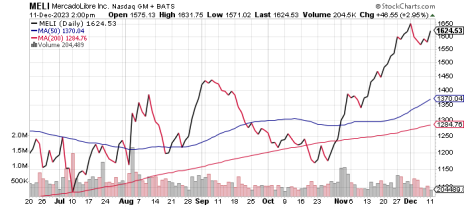We don’t typically cover Argentina stocks, and with good reason. After all, there are only 15 Argentina ADRs (American Depositary Receipts) that trade on major U.S. stock exchanges, and most of them are either very small, wildly underperforming—or both. MercadoLibre stock is neither of those things.
MercadoLibre (MELI) is an Argentine e-commerce company with a market cap of $82 billion and the stock is in the midst of a strong bounce following a 67% decline from September 2021 through last June.
[text_ad]
Why consider MercadoLibre after the recent price action? For many of the same reasons you might consider Amazon (AMZN) and Alibaba (BABA). It’s an e-commerce giant that dominates the country in which it is headquartered. Actually, MercadoLibre dominates an entire continent, with the largest e-commerce and payments ecosystem in all of Latin America. MercadoLibre has a presence in 18 countries, including Argentina, Brazil, Chile, Colombia, Mexico, Peru and Venezuela. In each of those countries, it’s the market leader in terms of unique visitors and pageviews.
With both an online merchandising and a growing digital payments business, MercadoLibre is almost a hybrid between Amazon and eBay (EBAY) or PayPal (PYPL). As Argentina, and South America as a whole, waited out the virus at home like most of the rest of the world, business picked up for MercadoLibre the way it did for Amazon and Alibaba.
Though the company struggled through most of its early years to maintain profitability (much like Amazon did in its early days), that has changed drastically: In 2021, the company earned $1.67 per share (up from losses of -$3.71 in 2019 and -$0.08 in 2020), EPS improved to a whopping $9.57 last year, and analysts expect EPS to more than double to $22.09 this year, and then top $34 in 2024.
MercadoLibre Stock vs. AMZN vs. BABA
To be sure, the valuation is high despite those lofty EPS projections, as MELI trades at 46 times forward earnings estimates – the share price is a bit sticker-shock-y near 1,600 as of this writing. But MELI stock has been expensive for a while, and these are some of the lowest multiples it’s traded at in the last few years and roughly half of what it was trading for last summer.
MELI has absolutely crushed both AMZN and BABA stock over a five-year period (up 397%, versus an 83% gain for AMZN and a 52% decline (!) for BABA) and its business has way more upside: according to Statista, only about 11% of retail sales in Latin America were online in 2022, compared to 5.5% in 2020. That figure is expected to rise to 20% of retail sales by 2026. The market in which MercadoLibre operates is relatively untapped, despite the immense sales growth in recent years.
Thus, it’s reasonable to think MercadoLibre stock could outperform AMZN and BABA, though the still-high valuation is a bit concerning, and the beta (1.6) is significantly higher than those other two stocks. MercadoLibre is significantly higher in 2023, up 97% YTD. And yet, MELI is 17% below its August 2021 peak, and the valuation is way less of a concern than it normally is, especially now that the company is making money hand over fist.
You could buy it right here, as it’s been in a strong uptrend since October, although it may be a touch extended over its key moving averages, at least for more conservative investors.
MELI is essentially a higher-risk, higher-reward version of Amazon or Alibaba. For the more adventurous investor, it’s worth adding to your portfolio.
Do you invest in MercadoLibre stock? Why or why not?
[author_ad]
*This post is periodically updated to reflect market conditions.


